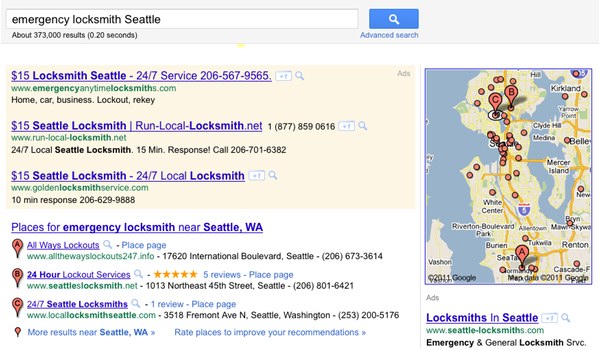Google’s Locksmith Spam Problem Hits The New York Times
The New York Times’ interest in the underbelly of SEO continues today with an article that details Google’s struggle to fight locksmith spam in Google Places. While not as deep as the Times’ recent articles on J.C. Penney’s SEO tactics and floral industry SEO, it nevertheless casts Google — again — as unable to keep […]
The New York Times’ interest in the underbelly of SEO continues today with an article that details Google’s struggle to fight locksmith spam in Google Places. While not as deep as the Times’ recent articles on J.C. Penney’s SEO tactics and floral industry SEO, it nevertheless casts Google — again — as unable to keep up with the tide of SEO spam.
Today’s article covers locksmith spam in Seattle — more specifically, the search query “emergency locksmith Seattle.” The image above shows what that search looks like now, but when the article was written, the Times says that seven local listings were showing — and none of them were actually locksmiths based in Seattle.
They are phone banks, typically set up in far-off places, often in other countries. Call them and they’ll dispatch a locksmith. Some are legitimate, but others may all too often do shoddy work and/or charge two or three times the estimate.
The Times explains that they create fake listings and/or use the real addresses of other entities (like government buildings) to get around Google’s local listing guidelines, then get insane amounts of local citations/references to improve their rankings.

- Searching For Small Businesses, Coming Up Frustrated (October 2008)
- Google Believes It Has Ended (Some) Hijacked Listings In Google Maps (February 2009)
- Investigating Google Places Hypocrisy For Address-less Businesses (January 2011)
When contacted about the locksmith spam issues, Google’s Gabriel Stricker gave this statement to the Times:
We’re aware of the gaming practices happening in the locksmith industry — practices which long predate Google and have affected the Yellow Pages for decades. We’ve implemented several measures to combat this issue, including improving our spam-detection algorithms and working with the locksmith industry to find solutions.
Although the Times’ article doesn’t reveal anything new, local search watchers and, more importantly, real local locksmiths can hope that the added exposure compels Google to finally solve this long-running problem.
Opinions expressed in this article are those of the guest author and not necessarily Search Engine Land. Staff authors are listed here.
Related stories
New on Search Engine Land
